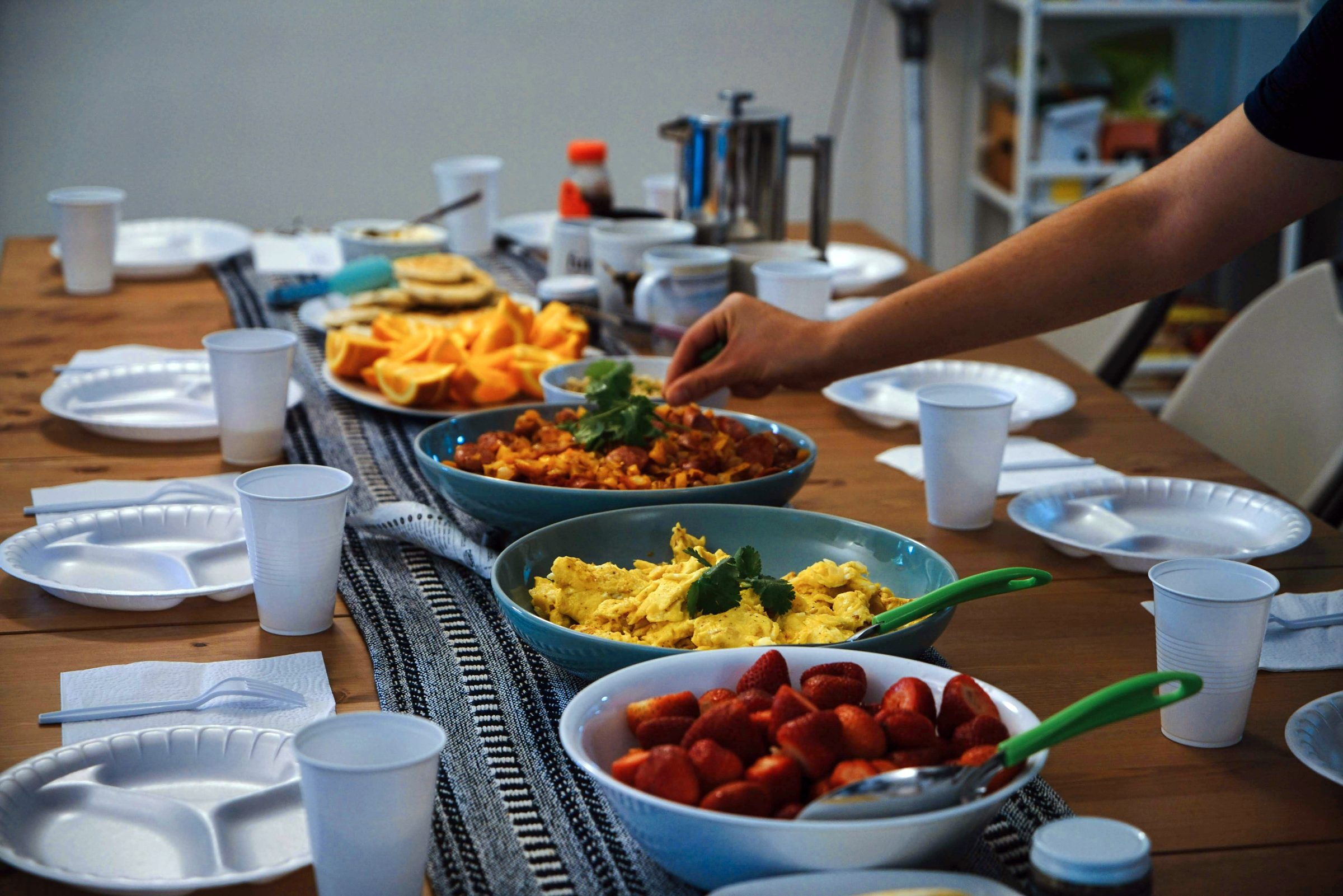Home » Community Food Systems » Dane County Food Action Plan » Mutual Aid for Food Security: When the Food Safety Net Frays, We Must Build Networked Resilience
Mutual Aid for Food Security: When the Food Safety Net Frays, We Must Build Networked Resilience

By Abha Thakkar
November 7, 2025
As many of you know by now, the federal government slowed the flow of Supplemental Nutrition Assistance Program (SNAP) benefits due to the federal shutdown (though it appears that, as of Friday 11/7, the State of Wisconsin has received the federal funds and will be distributing them), and we were faced with the possibility of a wave of mass hunger throughout our country. Forty-two million people (one out of eight) living in the United States who rely on SNAP have had their food benefits delayed. In Wisconsin in 2024, FoodShare, as SNAP is known here, had 705,400 participants (almost 12% of the state’s population), with 45,000 participants living in Dane County as of 2022.
This monthly loss of resources also represents hundreds of millions of dollars in Wisconsin alone that go to grocery stores and other private food vendors who accept FoodShare. The nation’s food security system is heavily dependent on direct federal benefits, which puts 10-12 times as many resources into grocery purchasing power for SNAP recipients as it does into the food bank/pantry system. Without federal SNAP benefits, we would be facing both a humanitarian crisis and a major economic loss for food sector businesses whose customers rely on SNAP to make regular purchases.
At this scale, there is no way that local institutions or governments would have been able to compensate for the loss of federal SNAP dollars in the short run, which underscores how quickly individuals and families can slip into food insecurity, especially as the risk of hunger rises with winter, inflation, and the coming holidays. And as families spend more money on food, other bills go unpaid, which leads to a higher risk of health conditions going untreated and households facing eviction and homelessness. The ripple effects are potentially devastating.
The beginning of the Covid-19 pandemic saw a food security crisis on a similar scale, but at the time the underlying cause was the collapse of global and domestic supply chains due to the stay-at-home orders needed around the world to contain the spread of the virus. It was the federal government’s eventual intervention that helped us meet basic needs during the pandemic. But we are now experiencing the withdrawal of that federal safety net. What happens now?
In this scenario, as at the beginning of Covid-19, mutual aid becomes a critical bridge. By “mutual aid,” we mean organized efforts by community members working together to share resources, time, skills, and support—not charity in the sense of “we help you,” but cooperation in the sense of “we build networked resilience together.”
These strategies don’t require large budgets or big organizations—just coordination, trust, and a willingness to share resources and time. In the face of federal funding disruption, strengthening local mutual aid is not a complete substitute—but it helps cushion the blow, preserve dignity for impacted families, and build community resilience.
With that in mind, here are some grassroots mutual-aid strategies that anyone—even those with limited means—can mobilize right away. Our team offered a workshop at YWCA’s 2025 Racial Justice Summit on mutual aid strategies for food security, and these ideas were generated, in part, by participants at that session:
- Partner with a local food pantry. Identify a pantry and commit to donating a regular set of items (canned goods, shelf-stable staples, extra produce).
- The City of Madison has compiled an excellent list of places to donate food, as well as guidelines on how to do it safely.
- Bulk purchasing as a group. Organize a small group of neighbors or friends to pool money, where everyone contributes what they are able, and buy staples (rice, beans, canned vegetables) in bulk, either to share equally among the group or to deliver to the pantry for redistribution.
- In-store voucher/credit program at a grocery store or farmers’ market. Work with a local grocery store or market to offer vouchers or gift cards that can be purchased by those with the means to do so and to be redeemed by people who need them.
- Community “take‐what‐you-need / leave‐what‐you‐can” shelf or fridge in a public space. Set up a shelf in a community hub (library, apartment complex lobby, neighborhood center) where anyone can contribute shelf-stable goods and anyone in need can help themselves anonymously.
- Meal delivery through a neighborhood center network. Coordinate with a local neighborhood center or church to run a rotating meal delivery program: households cook extra portions and drop them at the center, which then distributes to families who might be navigating benefit gaps.
- Micro-food-credit fund managed by a community organization. Together with others, place modest contributions into a fund managed by a local non-profit or neighborhood center; when SNAP delays occur, the organization issues grocery gift cards to households in need.
- Social-media “networking” option. While direct household-to-household outreach requires SNAP participants to self-identify, you can create a small closed social-media group (neighborhood Facebook or Nextdoor group) where households opt in as either “I can contribute” or “I need support.” Only operate this with clear consent and boundaries.
- Time/credit bank for food access. Establish a time-bank where individuals donate hours (e.g., collecting groceries, delivering meals). In exchange, beneficiaries accrue credits that can be redeemed for food help later when their benefits return.
- Urban Agriculture. Work with landlords, local businesses, and neighbors to install and support shared community garden plots during the growing season and vertical gardens in indoor spaces during the winter to support food production year-round.
Check out the following resources for other possibilities:
What ideas do you have for neighbor-to-neighbor support? We can all play a meaningful role in preventing hunger when federal safety nets falter.

